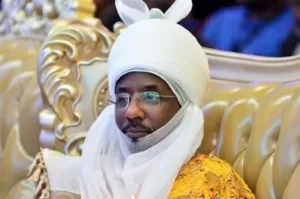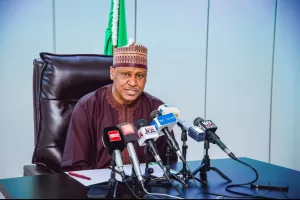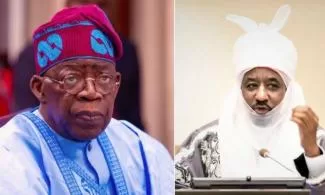The Emir of Kano, Muhammad Sanusi II, has declared that he will not offer advice to President Bola Tinubu-led government on how to resolve Nigeria’s current economic challenges.
Sanusi, a former Governor of the Central Bank of Nigeria, stated this while speaking at the 21st anniversary of Fawehinmiism with the 2025 Gani Fawehinmi Annual Lecture held at the Lagos Airport Hotel in Ikeja, Lagos State.
The Nigerian Bar Association (NBA) Ikeja Branch organised the lecture with the theme, “Bretton Woods and the African Economies: Can Nigerians Survive Another Structural Adjustment Programme?”
According to Sanusi, his decision stems from the government’s failure to behave like friends, despite their relationship.
Sanusi emphasised that he has the expertise to provide insightful analysis on the country’s economic situation, but has chosen not to do so. Instead, he believes it is the government’s responsibility to explain its policies and decisions to Nigerians.
The Emir also criticised the government for lacking credible individuals who can effectively communicate their policies.
He jokingly added that he would rather watch a movie with popcorn in his house than lend his expertise to the government.
Sanusi did, however, offer a parting remark, stating that Nigeria’s current economic woes are, in part, a consequence of decades of irresponsible economic management.
He said: “I can give a viewpoint that can explain what we are going through and how it was totally predictable, most of it and maybe avoidable.
READ ALSO: NIDCOM rejects $500 tax proposal for returning Nigerians
“But I am not going to do that. “I have decided not to speak about the economy or the reforms, nor to explain anything regarding them. If I explained, it would only benefit this government, and I don’t want to help this government,”
“You see, they’re my friends, if they don’t behave like friends, I don’t behave like a friend. I watched them being stewed and they don’t even have people with credibility who can come and explain what they are doing,” Emir Sanusi said, explaining his decision.
“I observe their actions, and they lack credible individuals who can effectively explain their policies. However, I’m not here to assist (them). I began by offering support, but I’ve decided to stop.
“I’m not going to help! “I will not discuss the matter any further. Let them come forward and explain to Nigerians why the policies they have pursued have been implemented. Meanwhile, I am enjoying a nice movie with popcorn in hand.

Although the Emir will not offer advice to the Federal Government or comment on ongoing reforms, he shared his thoughts on why the country was in the state it currently is in – unheeded warnings.
“But I will say one thing, what we are going through today is at least in part and necessary consequence of decades of irresponsible economic management.”
“People were warned decades ago that if they continued down this path, this is where they would end up. They chose not to listen.
“Is everything being done today, correct? No.”
“For now, I am here to honour Chief Gani Fawehinmi,” Emir Sanusi, before going on to call for a return to the foundational values of integrity and highlighting the lessons of the late Senior Advocate of Nigeria’s life.
“What we need to do is revisit our values. Do we truly possess those values? Are we genuinely committed to our work? What is the integrity with which we approach our tasks? For someone like Gani, these are the lessons from his life,” he said.
“I am here to remind us all of what he stood for, to encourage us, and to plead with us to return, as I mentioned recently, to the distinction between who we are and what we are. Our identity is defined by those qualities that Gani embodies. They revolve around our values – what we can control and who we are.
These values, the Emir believes, matter regardless of ethnicity, religion and region.
“If you are a thief, you are a thief—whether you are Yoruba, Igbo, Hausa, Muslim, Christian, a lawyer, or otherwise. That is your identity,” he said.
“You could be from the north or the south, wealthy or poor, a president or an emir. These are aspects of your identity. You may not like it, but that’s the reality. Can we please begin to reflect and stop taking pride in superficial, misleading distinctions?”

READ ALSO: Nigeria’s Inflation Rate Reaches 34.80% in December 2024
We don’t need your support for Tinubu’s policies — FG replies
Meanwhile reacting to the comments credited to the Emir, the Minister of Information and National Orientation, in a statement titled: “We don’t need Sanusi’s stamp of approval for our laudable policies,” expressed disappointment at the Emir’s alleged negative comments on the reforms of Tinubu’s administration because of his alleged “shift in loyalty.”
The statement read: “The Federal Government notes the recent remarks by His Highness, Emir Muhammadu Sanusi II, regarding the economic reforms introduced under President Bola Ahmed Tinubu’s administration, at a public event in Lagos. We note the emir’s acknowledgement of the noble initiatives which, he said; he could explain away but for his decision “not to help the government.”
“First, we acknowledge that Sanusi, and indeed any Nigerian, has the inalienable right to express an opinion either in form of commendation or criticism on how the government is being ran. However, we find it amusing that a leader, more so one from an institution that ennobles forthrightness, fairness, and justice would publicly admit to shuffling off saying the truth because of personal interest hinged on imaginary antagonism.
“It is pertinent to state that Nigeria is at a pivotal juncture where bold and decisive actions are necessary to tackle entrenched economic challenges. This administration has implemented transformative reforms not because they are easy, but because they are essential for securing Nigeria’s long-term stability and growth, as Emir Sanusi had consistently advocated.
“The temporary pains currently experienced from these inevitable decisions, as Sanusi himself acknowledged, are a “necessary consequence of decades of irresponsible economic management” more than anything else.
“These reforms are already delivering measurable progress. The unification of exchange rates has bolstered investor confidence, which has contributed to increased foreign reserves and strengthened Nigeria’s ability to shield itself from external economic shocks.
“The removal of the fuel subsidy has freed up significant resources, allowing for greater investment in critical sectors such as infrastructure, education, and healthcare. Projections from respected institutions, including the World Bank, show an upward trajectory in Nigeria’s GDP, signalling that our economy is firmly on the path to recovery.
“Additionally, by addressing inefficiencies, the country has reduced its debt service-to-revenue ratio, creating a more sustainable fiscal framework for future generations.”
Continuing, the statement said: “It is deeply disappointing that reforms widely recognized as essential by global experts—including by Emir Sanusi II himself—are now being subtly condemned by him because of shift in loyalty. His Highness, given his background in economics, has a unique responsibility to contribute constructively rather than undermine reforms aimed at collective progress because he feel estranged from his “friends” in government.

